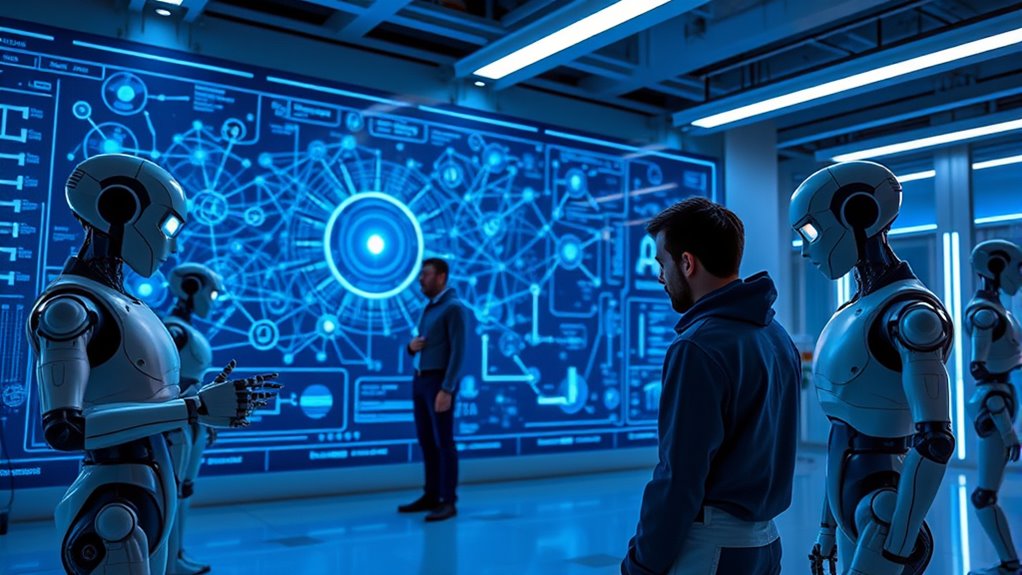AI agents are advancing beyond simple chatbots to make autonomous decisions, collaborate with multiple agents, and adapt in real-time across complex environments like healthcare, logistics, and smart cities. They analyze data, weigh options, and coordinate actions seamlessly, enabling smarter automation and more effective problem-solving. These developments are transforming industries and creating intelligent systems that can think, learn, and work together independently. Discovering what’s next will give you a deeper understanding of these exciting innovations.
Key Takeaways
- AI agents are evolving to make autonomous decisions beyond simple chat interactions, analyzing data and selecting actions independently.
- Multi-agent systems enable collaboration, coordination, and negotiation among AI agents for complex task execution.
- These agents learn from each other, adapt strategies, and increase system resilience in critical applications.
- Technological advancements like distributed processing improve AI communication, coordination, and data sharing capabilities.
- AI agents are increasingly integrated into everyday life, supporting automation, smart environments, and large-scale problem-solving.

Artificial intelligence agents are rapidly advancing as developers push the boundaries of automation and decision-making capabilities. You’re likely familiar with chatbots, but AI agents are now evolving far beyond simple interactions. They’re becoming sophisticated systems capable of autonomous decision making, which means they can analyze data, weigh options, and select actions without human intervention. This shift allows AI agents to operate seamlessly in complex environments, making real-time decisions that were once thought impossible for machines. With autonomous decision making at their core, these agents are transforming industries by handling tasks with speed and accuracy that surpass human capabilities.
AI agents are evolving beyond chatbots, making real-time decisions with autonomy and precision.
One of the most exciting developments is the move toward multi agent collaboration. Instead of functioning in isolation, multiple AI agents now work together, sharing information, negotiating roles, and coordinating actions to achieve common goals. Imagine a fleet of autonomous delivery drones that communicate with each other to optimize routes and avoid obstacles, or a network of intelligent sensors collaborating to monitor environmental conditions. This multi agent collaboration creates a dynamic, adaptable system that can tackle large-scale problems efficiently. It’s as if each AI agent plays a part in a well-orchestrated team, leveraging collective intelligence to solve challenges faster and more effectively than any single agent could alone. Additionally, the effectiveness of these collaborations is enhanced by inter-agent communication, which allows for more nuanced and coordinated interactions.
Developers are designing these systems with the goal of increasing resilience and flexibility. When multiple AI agents collaborate, they can compensate for each other’s limitations, ensuring continuous operation even if one component fails. This robustness is essential in critical applications like healthcare, finance, or autonomous transportation, where failure isn’t an option. As these agents learn from each other and adapt their strategies, their collaboration becomes more sophisticated over time, enhancing overall system performance. You might see this in smart grid management, where multiple AI-powered systems balance energy loads, or in robotic teams performing complex assembly tasks. Additionally, understanding the principles of ethical considerations in AI development is crucial to ensure these systems operate safely and responsibly. Moreover, advances in distributed AI systems are enabling these agents to process data more efficiently across networks, further improving their coordination capabilities. These systems also benefit from robust data sharing, which allows seamless and secure information exchange among agents.
Furthermore, advances in automation’s role in business intelligence are enabling these AI agents to process vast amounts of data rapidly, providing insights that guide their decisions. The integration of autonomous decision making and multi agent collaboration isn’t just about more advanced technology; it’s about creating systems that can think, adapt, and work together more like humans do. You’ll find these AI agents increasingly embedded in everyday life, from managing smart cities to supporting complex logistics. They’re designed to operate independently but also to coordinate seamlessly with other agents, resulting in smarter, more responsive environments. As developers continue to refine these capabilities, the potential for AI agents to revolutionize how we work, live, and solve problems is expanding rapidly.
Frequently Asked Questions
How Do AI Agents Handle Complex Multi-Step Tasks?
When tackling complex multi-step tasks, you should focus on multi-step reasoning and task decomposition. Break down the task into smaller, manageable parts, allowing the AI agent to handle each step sequentially or in parallel. This approach helps guarantee accuracy and efficiency. By guiding the AI to analyze each component, you enable it to solve multi-step problems more effectively, leading to better outcomes even in intricate scenarios.
What Are the Ethical Considerations for Advanced AI Agents?
Like steering through a minefield, handling advanced AI agents requires careful ethical considerations. You must focus on bias mitigation to prevent unfair outcomes and establish accountability frameworks to assign responsibility for decisions. These measures help ensure AI acts transparently and responsibly. As AI becomes more sophisticated, your role involves proactively addressing these issues, safeguarding human interests, and fostering trust in AI systems by embedding ethical standards at every development stage.
How Do AI Agents Learn From Real-Time Data?
You want to know how AI agents learn from real-time data. They do this through data ingestion, where they continuously gather information from their environment. Reinforcement learning plays a key role, allowing them to improve actions based on feedback. As they process real-time data, they adapt their behavior, making smarter decisions over time. This dynamic learning process helps AI agents become more effective in their tasks.
What Industries Are Most Likely to Adopt Advanced AI Agents Soon?
You’ll see industries like healthcare and finance adopting advanced AI agents soon. In healthcare innovation, AI agents help with diagnostics and personalized treatment plans, improving patient outcomes. Financial automation benefits from AI agents managing transactions, detecting fraud, and providing investment insights. These sectors recognize AI’s potential to boost efficiency, reduce errors, and deliver better services. As AI advances, expect faster adoption and more integrated solutions transforming how these industries operate daily.
How Do AI Agents Maintain User Privacy and Data Security?
You might worry that AI agents compromise your privacy, but they actually prioritize security. They follow strict privacy protocols and implement advanced security measures to protect your data. These include encryption, access controls, and regular audits, ensuring your information stays safe. By actively maintaining these protocols, AI agents can deliver personalized experiences without risking your privacy, proving security isn’t an obstacle but a foundation for trustworthy AI interactions.
Conclusion
So, here you are, marveling at these shiny new AI agents, thinking they’ll save the day. But remember, behind every clever bot is a potential chaos creator, ready to misfire or misunderstand. As you *enthusiastically* watch them evolve beyond chat, don’t forget: they’re still just machines, promising much and delivering… well, let’s just say, entertainment. Keep your wits sharp; the future’s bright, unpredictable, and maybe a little bit hilarious.









